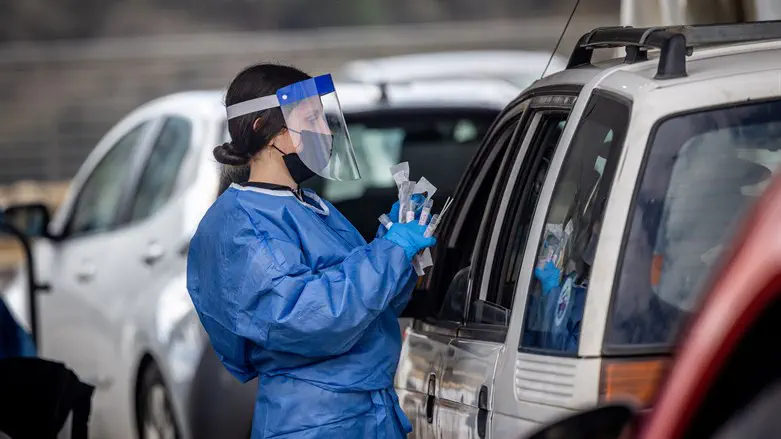
Prof. Ron Balicer, head of the panel of experts which advise the Cabinet on coronavirus matters, addressed the rapid spread of the Omicron strain and the recent breaking of morbidity records in an interview with Israel Hayom Sunday morning.
"There are no predictive models for what it will be like at the peak. There are too many unknown factors to predict at the moment what the number of infected will at the peak, and the estimated date we will reach it. There will be millions of infected, so there will also be many hospitalized in serious condition," Balicer said.
"In recent weeks we have learned that Omicron behaves fundamentally differently from previous strains we have known. The differences between it and Delta are greater than between the Delta, Alpha and other strains. It has different mechanisms of cell entry and is conducted differently at the cellular level. Omicron infects more upper respiratory cells and less so the lung. All of these differences at the cellular level probably help explain why its violence is less than Delta's. At this point it is clear to us from the British data that the risk of severe hospitalization is at least 3 times lower than Delta. And that is good news, but since it is more contagious than Delta and is able to infect both people who have been ill in the past and people who have been vaccinated, then the number of infections will be greater and the number of accumulated hospitalizations may also be higher. That is why the health care system is preparing for worst-case scenarios," Balicer added.
"We still do not know what the rate of infection will be but we have heard in the past the herd of herd immunity. We now see that what happens to people who have been infected in previous rounds is that they are currently vulnerable to re-infection. The aim at any stage should be to prevent infection as much as the daily behavior and immunization allows, and remember that a vaccine gives the protection without absorbing risks. It is not certain that those who are infected with Omicron will be protected from other strains and later infection.
He also referred to the new testing outline, saying: "If we could preserve the previous testing policy in the reality of tens of thousands of infected a day we would do it. But since this is not possible, certainly not when the numbers continue to double, changing the guidelines was a necessity of reality. The system would not have been able to provide a response on a proper schedule with any further daily doubling of the number of infected."
"It was appropriate, as has been the case, to prioritize testing for the population most in need - the elderly and vulnerable who need early treatment after infection. Our ability to monitor the spread of the disease will indeed be impaired, but we will continue to monitor the situation according to infections in those aged 60 and over, along with the 4th vaccine doses and influenza, as well as the hospitals, which have seen no changes in the guidelines." he added.
Prof. Balicer noted that "despite Omicron's high levels of infection, at-risk populations can avoid being infected with the current wave. Those who have not received the third dose must be vaccinated (there are 400,000 people over the age of 40 who have not yet received a third dose). A person entitled to a fourth dose can receive a fourth dose and re-raise his antibodies to the state he was in after the third dose. Evidence from the UK that these people have almost 90% protection against a serious illness from 'fresh' booster shots."
"The second thing is to keep wearing a mask in any enclosed space and gathering. In addition, events that take place indoors should be avoided except for essential daily activities. The older population should continue as usual to maintain social activity and meet people, but strive to do so outdoors or in a ventilated space as much as possible. On the one hand, one should avoid multi-participant activities in enclosed spaces, but on the other hand not reach a state of social isolation and to continue activities and meet with friends," he concluded.

